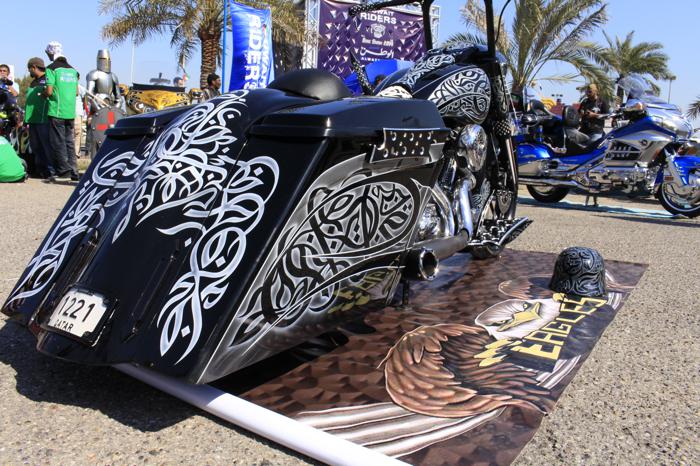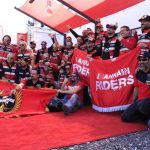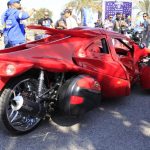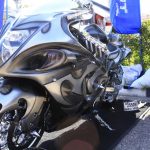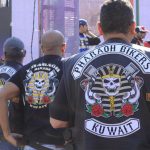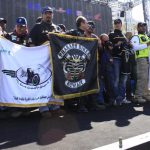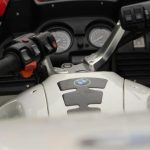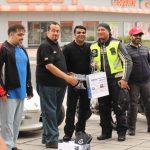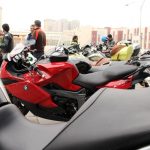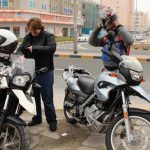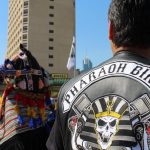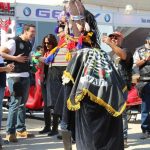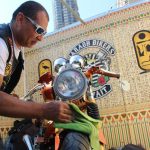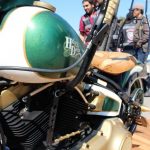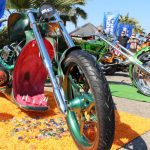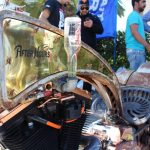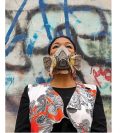A young man, perched on his motorcycle, came up from behind the car without a helmet. He prepared to do another stunt and the vehicle driver clenched his fist on the steering wheel, heart in throat. In the lane next to him a young lady focused on her phone instead of the road. All it would take is a slight slip of the two wheels or a careless move by the young girl, and the driver could very possibly be part of a fatal accident.
But, for four days in February, a very different type of motorcycle riders and enthusiasts from around the Middle East began to pull into the gravel parking lot adjacent to the Safir International Hotel. The four-day event was coming to an end with a group ride around the city and a final bike show. Hundreds of participants polished their Harley Davidsons, Hondas, Ducatis and BMWs. Everyone wore an armor of leather, and a shiny helmet rested on his or her bike or in their arms while they checked their engines. Road captains and safety officers donned their fluorescent yellow apparel and group members in their clubs’ logo printed vests lined up behind them. They were excited about the ride, but safety was their main concern.
“We have to have safety gear, and respect speed limits, traffic lights and junction rules,” said Muhannad Al-Mansouri, founder of Kuwait Riders, who were the main organizers of the event. “If we don’t respect the road the road won’t respect us.”
This is their fourth annual bike show, and the biggest of its kind in the Middle East. Over four days, the group honors riders from all over the region with events, competitions and, of course, the Friday morning parade. Motorcycle riders around the country have gained the support of local businesses, international judges and the Ministry of Interior. With highly organized events, charity work and a unified heightened concern for safety, they are changing the perception of riders across the Middle East.
“We have a rider network from Oman to Jordan,” said Al-Mansouri. “The riders come from all over the Middle East and we’ve got international judges from Europe who organize the European Bike Week. We want people to go out and enjoy the riding time and enjoy the riding season and come back safely at the end of the day to their families.”
The 3,000+ attendees in the event share a deep love for the ride itself. They treat their bikes like they were second children, and truly only feel free when they are on the road. We asked riders how they would describe riding in one word and most responded with: freedom, love or passion.
Riding in a group isn’t just about having a great time though. It’s about saving lives. For Jafar Behbehani, owner of TriStar Motors and Academy, and founder of the first biking group in Kuwait, safety is the driving force behind his business.
“All of my customers are like my children,” he said. “You will always have people that misuse equipment. But, the safe riders are the community that set the standard, and it is really stupid to not protect yourself on a bike. Simple as that.”
Behbehani started riding in Kuwait after he completed his university studies in the United States, and eventually was able to turn his hobby and passion for motorcycles into a business that is now the authorized dealer for both BMW and Ducati bikes and the largest supplier of safety and gear with the biggest service center for motorcycle riders.
At first, TriStar was a dealer that provided training services for a few of their customers. However, by 1997 the demand had grown enough for Behbehani to start TriStar Academy, the country’s biggest bike operation school.
Today, a prospective customer can attend a 10 session training course with the TriStar trainers that will teach them how to handle a bike, the importance of safety gear, maneuvers to avoid road hazards and help the rider obtain a motorcycle license. The team takes great pride in their ability to pair customers with the perfect bike, and their on-road preventive training. Behbehani personally addresses every bike sale from his dealership and has sometimes even refused customers.
“I have stopped fathers from buying bikes for their sons,” he said. “If he isn’t willing to go out with him and ensure his safety, I will not sell him the bike. It is a responsibility to buy a bike, and the owner has to be up to it.”
Behbehani has personally trained all his children. When he took his son out at 4 years old for his first lesson, he had him padded in safety gear from top to bottom. His son said to him, “Daddy you are dressing me as if I am going to fall.” Seconds after his first pull out, the young rider was indeed, on the floor, thankful for the caution of his father.
Behbehani also focused on improving official road safety. His dealership has been providing the Ministry of Interior with BMW bikes since 1994, and he personally handles safety training for the officers. One of the most pressing safety issues for officers, is catching reckless drivers who don’t adhere to laws and regulations in this country.
“Motorcycles can be confiscated and the driver’s license can be revoked if they don’t wear their helmets,” said Salem Al Rumaid, TriStar operations manager.
According to Al Rumaid, one of the difficulties traffic cops have is stopping the young men on bikes without helmets, without risking their safety. Often times those bikes travel at incredibly high speeds to evade the cops. Chasing helmetless could result in a fatal accident. Their heightened level of caution often means perpetrators are able to get away.
One of Behbehani’s greatest contributions to motorcycling in Kuwait is to establish a community that works hard to raise awareness on these issues, and show how fun riding can be. He remembers clearly on March 7, 1992, the Friday after the end of the invasion, when he headed out with his bike to the Radisson SAS, for breakfast, before a morning ride. There, coincidentally, he found a bike he had recently sold, sitting in the parking lot, as the new owner, Ron Jack was also inside having breakfast. They met and decided to ride together afterwards. The tradition of breakfast at The Radisson SAS followed by a ride has continued for more than 20 years. It is what Behbehani now considers his Friday morning diwaniya and their most recent breakfast hosted more than 400 riders.
In 1992 Behbehani created the first official bike club in Kuwait, the Desert Stars, and by the next year they made international trips to the United Arab Emirates and other Gulf nations.
Before the turn of the century most of the riders were middle-aged men who were very concerned with safety. However as the group grew, so did the variety of bike owners. For younger riders, Ducati bikes, an Italian brand with a focus on racing, were extremely popular. While the motorcycle industry encourages racing on controlled tracks, finding an outlet for their need for speed was difficult. However after they established the Ducati Club Kuwait in 2006, they could visit tracks in Dubai and now Qatar for high speed thrills on world class tracks.
For roads in the Arabian Gulf, the most popular bike choice is Harley Davidson for which TriStar was a reseller until 2006. By 2000, half of the group owned Harleys because the low seated design is ideal for the straight desert roads of Kuwait and the Gulf. When the company opened its official showroom in 2006, they created the Kuwait chapter of the Harley Owners Group. The international organization, known as HOGS, was established in 1983 in the United States to create brand loyalty, and distinguish the majority of law-abiding bike riders from the rambunctious groups, known as the one-percenters to raise fledging sales.
“There is a difference between the one percenter outlaw bikers and the rest of bikers,” said Hady El Khodary, president of the Egyptian rider group Pharaoh Bikers. “Biking here is for doctors, bankers and businessmen, and safety is our big issue and our main concern.”
While bikers all over the world have left spectators in awe at the awesome power they emit as a group riding down the street, they have also suffered from a stigma brought upon by sensational press and media coverage.
The bad boy reputation was born in the west, and started after World War II when veterans returned home to the US, bored of the monotony of civilian life. Many had learned to drive motorcycles for use in combat, others had ridden recreationally to relieve the stressful days. By the time they returned home in the late 40s bike racing was a huge sport that attracted more spectators than any other, including the American favorite of baseball.
One city in particular, Hollister, was a hotspot for bike racing. In the summer of 1947, the California town was host to the annual Gypsy Race (comparable with today’s Nascar races). Bikers from around the country were in attendance, and some of the more rowdy bikers took to the town to drink, drag race and cause a disturbance.
According to the International Journal of Motorcycle Studies, “the ruckus did result in some minor storefront damage and at least one misdemeanor arrest for public indecency, but did not begin to approach the siege that Life magazine portrayed.” The article, titled “Cyclist’s Holiday: He and Friends Terrorize Town” sensationalized the event and left a lasting mark that even today’s riders in Kuwait are now battling against. Ironically, the groups that now continue to project the biker as a rebel image were encouraged by the article to form motorcycle clubs like Hell’s Angels.
Today, the Harley Owners Group boasts of over one million members in 1,400 countries. Their members participate in local and international events, and are connected with Harley riders when they travel. The local chapter boasts of 460 members and is involved with charity organizations, participates in rides around the region and organizes safety seminars.
The comrade established among riders of similar bikes grew to strong bonds of friendship. Naturally, similar nationalities broke off into their own group. The first to do this was the Phoenicians, a Lebanese group. According to the group’s current president, Mazen Abdelsamad, it started with just five members who would meet casually for rides outside of those organized by the larger HOG group. Eventually, more and more Lebanese riders, and a few Egyptians became their own entity.
“Our group is not open, and it is open for everyone,” said Abdelsamad. “We don’t ask for applications, we ask members to go out with us and see us. We have rules for safety and organization that we strictly adhere to.”
Many of the riders in the Phoenician group learned to ride on Lebanese terrain. With a landscape that can go from beach to mountain in less than 30 minutes, the country offers an unparalleled variety of scenes for bikers, at a price. The roads make sharp turns and wind heavily in the steep upward slopes.
“Not everyone can ride in Lebanon,” said Abdelsamad. “Many riders who have only ridden in Kuwait find it very difficult when they first ride in Lebanon. But, the HOG group makes you feel very safe and able to enjoy it.”
The group has tapped into their roots to improve the safety precautions in their rides. Last year they flew in a certified instructor from the HOG Lebanon chapter to train 16 of their members. Besides leisure rides around the country (the group once did a 960 KM ride all over Kuwait, without going on the same road twice), the Phoenicians have been major participants in blood donation events, special needs institutes and the animal shelter PAWS.
Motorcycles hit mainstream in 2003 with the creation of the Euro. Suddenly, countries all over the Middle East were approving vehicles from Europe that were once impossible to find due to taxation and currency complications. As the number of riders increased, so did the interest in joining a group. For Al-Mansouri, creating a Kuwait centered group became paramount.
“I was in other groups, so I thought to myself: Why am I doing publicity for other people?” he said. “If it weren’t for the people of Kuwait we wouldn’t have any of this. The government has given us everything, and the country is for Kuwaitis and non Kuwaitis that live in and respect the country.”
Today the Kuwait Riders group boasts of more than 500 members. They have secured sponsorships from the Historical, Vintage and Classic Car Museum in Kuwait, Al Watan TV, Al Ghanim Industries, Honda and Safir International Hotel. While the funding aids them in creating major events like the Annual Kuwait Bike Show, they remain fiercely loyal to the country.
“It’s all about the Kuwaiti flag,” said Al-Mansouri. “That is why the only thing you see on our vest is the Kuwaiti flag. No sponsors or anything.”
The group has also been instrumental in organizing international rides. The most memorable of which was a two-week tour of six European countries during the annual European Bike Week in Lake Faak, Austria. Kuwait Riders was joined by members of various groups including the Phoenicians and the Egyptian group the Pharaoh Bikers.
Hady El-Khodary, safety officer for the Egyptian group was one of two members that joined the Kuwait Riders Euro trip with his wife riding as a passenger. He has been riding for years, and decided to form an Egypt-centric club after experiencing the success of the Phoenicians and meeting with the HOG Egypt group. They made their debut at last year’s bike show, and this year they were present in a big way with music, traditional sufi dancers and paper motorcycle models for the kids.
“We are a big family, we are Egyptians, we are totally into bikes and we like to enjoy ourselves,” he said. “This [riding] is the way we like to enjoy ourselves.”
For him, motorcycle groups create a community that truly enriches every part of his life. He notes that for many of the members, having time to talk off the bike creates both personal and professional relationships. Entrepreneur riders are able to find a bank representative to help fund their idea, a connection in the government to assist with licensing and even a real estate manager who can help them find an office space.
“I can totally depend on my biker family,” he said. “The rides with all the groups are particularly fun because you get to meet riders from all over the country.”
At the end of the day though, it is about getting on your bike and feeling the freedom of an unobstructed view as you ride through town. It is impossible to use any of the every day distractions like text messaging or Facebook, and conversations are limited to those within your bluetooth range.
“You have the same passion and concern. The same concern of safety and the same passion for motorbikes,” said El-Khodary. “If you put attitude and personality aside you are similar. What is important to me is when we ride together we ride safe. You won’t expect the attitude or personality to affect you when you are riding. It’s just two things when you are on a bike: passion and safety.”
While he and most of the other riders continue to improve their groups’ safety regulations, they hope that events like the bike show, morning rides and community service events will garner the respect of drivers. Then perhaps the next time someone picks up their phone to text and drive they will remember the danger that they are unwittingly putting themselves in, and the fatal risk they pose to legitimate motorcycle riders.
Ready to ride?
Contact the various clubs with the information below:
BMW MOTORCYCLE CLUB
Open to all BMW bike riders
Facebook: Search Kuwait BMW Motorcycles Club
Instagram: q8_bmw_club
Website: kuwaitbmwmotoclub.com
KUWAIT DUCATI CLUB
Open to all Ducati bike riders
Facebook: Search Kuwait Ducati Club
Instagram: q8_ducati_club
HONDA RIDERS GROUP
Open to all Honda bike riders
Visit the Honda showroom in Shuwaikh or call: 1822 777
HARLEY OWNERS GROUP
Open to all Harley Davidson bike riders
Facebook: HOG.Kuwait
Instagram: hog_kuwait_chapter
Website: http://www.hog-kw.com
KUWAIT RIDERS
Open to all riders in Kuwait
Facebook: kuwaitriders
Instagram: kuwaitriders
Website: http://www.KuwaitRiders.com
PHOENICIAN CLUB
Lebanese-centric
Facebook: Search Phoenician Riders – Kuwait
Instagram: phoenician_riders
PHARAOH BIKERS MOTORCYCLE CLUB
Egyptian-centric
Facebook: pharaohbikers
Instagram: pharaohbikers
MOTO LADY CLUB
For Women
Facebook: ladymotoclubq8
Instagram: motoladyclub
Check out our article Not Just For Men for more on the Moto Lady Club.
FOR TRAINING CONTACT TRISTAR ACADEMY:
Phone: 2240 5194
Email: info@tristarkw.com

